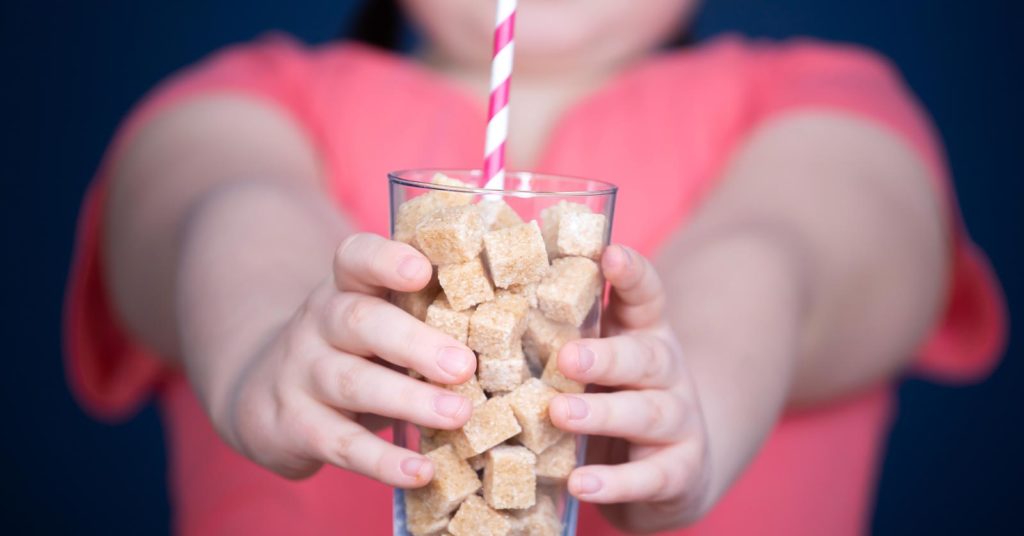
There are only a few things that light up a child’s face like a sugary treat. Born with a sweet tooth, most children love their dose of daily sucrose and glucose in the form of candy, sweets and more. Parents find it easy to reward them with a sweet treat for their good behavior; however, it puts them at risk for health consequences. Sugar affects children differently than adults and requires that we oversee how much they consume daily.
The Right Quantity
As per AHA (American Heart Association) recommendations, children below the age of 2 years should never consume added sugar and children between 2-18 years old are recommended a daily intake of 25 grams (6 teaspoons) or less of sugar. (Team 2020) A study proved that more than 81% of the children consumed more sugar than the recommended daily intake. (Newman 2020) Excess sugar intake at a young age is also often associated with a higher Body Mass Index (BMI) at a later stage in life.
Sugar and Hyperactivity
A common belief is that sugar creates hyperactivity in children. Children’s birthday parties full of cake, soda and sweets make most parents cringe at the thought. You might be surprised that research debunks the sugar/hyperactivity connection. (Newman 2020) Sugar sensitivity with regard to hyperactivity varies greatly from child to child. However, scientists have proven that the effect of sugar is not as much as believed by parents and assumed by society at large.
Other Ways in which Sugar Affects Children
Sugar is considered 8 times more addictive than drugs like cocaine and a diet high in sugar can increase the risk of many diseases and health issues for children, especially in the later years of their life. (Team 2020) Here are certain ways in which sugar affects children:
Suppression of Immune System
A diet that is high in sugar or refined carbohydrates can result in a weakened immune system. Consuming a lot of such food and beverages can reduce your body’s ability to ward off diseases and make you more susceptible to diseases.
Linked to weight gain and obesity
Sugary foods lack nutrition and cause weight gain which often leads to obesity as an adult, resulting in cardiovascular disease, diabetes, fatty liver, joint pain and more.
Increased Risk of Diabetes
Sugar intake also can lead to raised insulin levels and is a cause behind Type 2 Diabetes. Diabetes is known to harm your child’s kidneys, eyes and blood vessels. While this disease is more common in adults, studies show that it is on the rise among children, especially cause of obesity.
Effect on Eyesight
An increase in blood sugar levels can lead to swelling of the eyes which affects eyesight causing swelling, creating blurry vision. Reducing the intake of sugar can change this and return eyesight to normal.
Increase in Digestive Issues
Too much sugar can decrease the good bacteria in the gut, leading to digestive issues like gas, heartburn, indigestion, and also reduce the absorption of important nutrients from the food consumed. Poor digestion of sugar is also linked to diarrhea.
Smart Sugar Substitutions
You can find healthy recipes on websites such as Pinterest. Here’s a healthy breakfast or after school snack that is created without added sugar found on the website Simply Quinoa. The sweetener in the recipe is naturally sweet pure maple syrup which has ⅔ the amount of sucrose or table sugar. (Gunnars 2018)
While hyperactivity and consumption of sugar might be unrelated sugar affects children by exposing them to many health risks that can be as simple as a tooth cavity to something as complicated as diabetes. Regulating your child’s intake of sugar and introducing healthy sweet foods such as fruit and unsweetened fruit juices in moderation will keep your child on the path to good health.
Works Cited
Newman, Tim. “Does Sugar Really Make Children Hyperactive?” Medical News Today, MediLexicon International, 21 July 2020, www.medicalnewstoday.com/articles/medical-myths-does-sugar-make-children-hyperactive
Team, Children’s Health. “Sugar: How Bad Are Sweets for Your Kids?” Health Essentials from Cleveland Clinic, Health Essentials from Cleveland Clinic, 12 Aug. 2020, health.clevelandclinic.org/sugar-how-bad-are-sweets-for-your-kids/
Habermeyer, Sharlene. “14 Terrifying Signs Your Kids Are Eating Too Much Sugar & How to Fix It.” Good Parenting Brighter Children, 4 Jan. 2021, goodparentingbrighterchildren.com/negative-effects-of-sugar/
Gunnars, K. (2018, November 15). Maple Syrup: Healthy or Unhealthy? Retrieved January 16, 2021, from https://www.healthline.com/nutrition/maple-syrup#:~:text=Maple%20syrup%20is%20about%202,around%2060%20grams%20of%20sugar.

